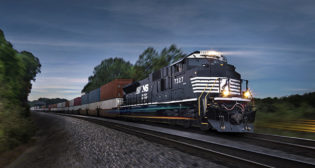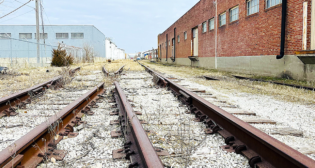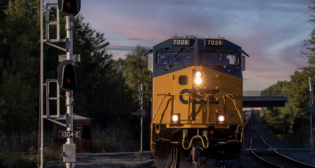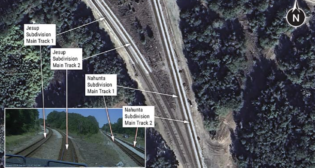
Cowen Shipper Surveys in a COVID-19 Environment Show Declining Expectations
Written by William C. Vantuono, Editor-in-ChiefThe results of Cowen and Company’s 1Q20 Rail Equipment and Rail Shipper Surveys, conducted by Managing Director and Railway Age Wall Street Contributing Editor Jason Seidl, with Airfreight and Surface Transportation Analysts Matt Elkott and Adam Kramer, indicate declining railcar order and pricing expectations. Following are summaries:
Rail Shipper Survey, Equipment
Order expectations by the shipper subgroup of railcar buyers declined relative to 4Q19. This is because shippers now expect their business growth to all but halt. Among railcar suppliers, we favor Trinity due to the flexibility of its manufacturing/leasing model, and Greenbrier, whose international diversification and cost-cutting could soften the blow of COVID-19. GATX’s lease terms offer it some protection.
When it comes to order activity we consider four key metrics: (1) The percentage of “all participating shippers” who will or may order railcars. (2) The conviction level about ordering (the split between “yes” and “maybe”) within this “all participating shippers” group. (3) The percentage of “same shippers” who will or may order railcars. (4) The conviction level about ordering (the split between “yes” and “maybe”) within this “same shippers” group. All four metrics deteriorated in 1Q20.
Responses to the question about order sizes were mixed, and included one potential silver lining: The percentage of shippers who plan to order more than 2,000 units increased to 10%, from 3% in 4Q19. This increase could be attributable to a small number of shippers wishing to take advantage of possible price decreases during the downturn.
Roughly 47% of all shippers surveyed said they will or may order railcars in the next 12 months. This compares to 51% in our 4Q19 survey. About 54% now say they do not plan to order railcars, compared to 49% in our prior quarter survey. Within the 47% of total shippers who are contemplating orders in the next 12 months, 53% said “yes,” they plan to place orders (57% in 4Q19), while 47% said “maybe” (43% in 4Q19). This points to a decreased level of certainty about ordering within the total shipper group relative to the past quarter.
On a same-shipper basis, about 43% of same shippers in 1Q20 said they will or may order railcars, compared to 51% in 4Q19. Roughly 56% do not plan to order railcars, compared to ~49% in 4Q19. Within the 43% of same shippers who are contemplating orders in the next 12 months, 44% said “yes,” they plan to place orders (59% 4Q19), while 56% said “maybe” (41% in 4Q19)
Rail Shipper Survey, Pricing and Service Quality
Shippers anticipate rail prices to increase by only 1.9% over the next 6-12 months, below 4Q19’s 3.0% expectation and the survey’s 10-year average of 3.7%, and near long-term rail cost inflation. On a same-shipper basis, shippers anticipate an even slightly larger decline. One could attribute the weak pricing expectations to the rails capitulating on price after sustained volume weakness, but the more likely culprit in our view is simply COVID-19.
Economic and business expectations from the survey were decidedly negative, with some survey results at all-time lows. A staggering 78% of respondents believe there will be a recession in the next six months, more than triple last survey’s 23% response and roughly in line with the more recent responders in our 1Q20 Cowen Carrier Survey. Shippers expect their businesses to barely expand over the next 12 months, with this quarter’s 0.3% growth expectation down 210 bps sequentially and by far the survey’s lowest ever. Only 23% of shippers expect their employee counts to increase over the next 12 months, well below the survey’s 39% average. Similarly, only 10% of shippers are more confident in the direction of the economy today than they were three months ago, down from just 54%last survey and below our survey’s 48% long-term average.
COVID-19 has affected 85% of respondents’ businesses; were our survey conducted even a few days later, this answer could have been even higher. Shippers expect an average negative impact of ~10%, though 10% of shippers believe COVID-19 has actually been a positive. When asked when they anticipate a “return to normal”, only 1% and 10% believe it will occur in April and May, respectively, while 42% cited August 2020 or later in 2020.
The average “positive” rating of Class I rail service slightly increased sequentially to 61% from 60% in 4Q19. CN and Norfolk Southern improved the most sequentially, with Union Pacific, Kansas City Southern and KCS de México also improving, though only slightly. In 1Q20, KCS received the highest “positive” rating for the second consecutive quarter, with CN and BNSF following very closely behind. Y/Y, the average increase (except Ferromex and KCS) in “positive” ratings was 15%. UP improved the most y/y, with all of the Class I’s improving in the double-digit range.
The railroads countered an environment of declining traffic in 2019 (-4.0%, including –7.5% in 4Q19) and thus far 2020 (~–7.0%) by maintaining pricing. Should pricing now be in question too, we believe that the railroads implementing PSR are best positioned, as PSR can help soften the double blow of lighter volumes and declining pricing power. As the railroad doing the best job implementing PSR in our view, KCS remains our top rail pick. KCS also looks best positioned when the economy begins to recover, especially if more people look to near-shore their supply chains.



